Russia
Русские излечили Европы от милитаризма.
2 Feb 2013 «Бородинское сражение, окружение немцев под Сталинградом, переход Наполеона через Березину, прорыв блокады Ленинграда, капитуляция немцев в Сталинграде — Россия отмечает один военный юбилей за другим. Но не только Россия…
Битва на реке Березине — эпохальное событие и для маленькой Швейцарии… 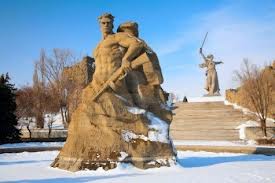
А 2 февраля отмечается юбилей еще одного русского урока — 70-летие победы Красной Армии в Сталинградской битве.
И Березина, и Сталинград были кульминациями кровопролития, ужаса и героизма во время войн, в которых агрессивные европейские гегемоны потерпели в России крах. Но Наполеон — не Гитлер, швейцарские гренадеры 1812-го — не фашистские захватчики…
Тем заслуженнее и страшнее был для немцев сталинградский урок. Разгром 6-й армии сломал шею не только немецкой вере в «окончательную победу», в Гитлера. Сталинград стал символическим поражением, сломавшим «прусский» менталитет немцев, выбившим из них комплекс военного превосходства. Сталинград превратил «Великую Германию» для немцев в абсурд .
Гибельные подвиги на российских просторах исцелили и швейцарцев, и немцев от милитаризма и ура-патриотизма. А до них и шведы получили тот же урок — под Полтавой; они еще триста лет назад решили раз и навсегда, что не будут играть в супердержаву. Сегодня эти нации тихо-мирно производят часы «Брайтлинг», автомобили «Мерседес-Бенц», мебель «Икеа». И живут в общем-то комфортнее населения страны-победительницы…
А россияне, как и украинцы с белорусами, могут гордиться, что их страна несколько раз становилась могилой для западных захватчиков. И Россия гордится…
Шведы, швейцарцы и немцы крепко получили по мозгам в России и набрались ума от горя. А другие в других местах: в горах Афганистана, в Хиросиме и Нагасаки, под Сайгоном, в Алжире. Все империи мира потерпели свои поражения, кто-то сделал из них выводы, кто-то не очень…
Придуманный Рэмбо русским не нужен, у них есть настоящие герои. Когда эти герои воевали и умирали в Сталинграде, за них «болел» весь свободный мир. Я не знаю в американской военной истории ни одной победы, сравнимой со сталинградской. Однако и у русских есть поводы для размышлений. Американцы никогда не терпели таких разгромов, как у Цусимы, при Танненберге или в котлах под Вязьмой и Брянском.
Но листая российские учебники истории, эти события либо вообще не находишь, либо узнаешь, что они являлись лишь предпосылками для неминуемых грядущих побед… »
Статья – – Штефан Шолль – Московский Комсомолец № 26153 от 2 февраля 2013 г. Stefan Scholl Moskovskij Komsomolets
В Сталинградской битве на стороне немцев воевали и представители других стран Оси. Были ли итальянцы в Сталинграде во время знаменитой битвы? На этот вопрос долгие годы не было четкого ответа. Участвовавшие в битве итальянские войска были в основном на Дону – то есть далеко, в тылу, ожидая переброски на Кавказ.
– После поражений в Греции фашисты придумали очередную авантюру, крестовой поход против большевизма, – рассказывает итальянский ветеран, 91-летный Гвидо Веттораццо. – У нас царила полная неподготовленность: были даже случаи, когда грузы со снабжением для наших солдат, находящихся в Африке, посылали в СССР, и наоборот… 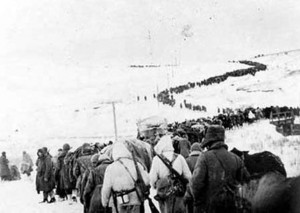
«Мы не знали даже, что происходит в соседней с нами дивизии. Представьте, были ли мы в курсе о Сталинграде!» – говорит 95-летный Карло Вичентини из городка под Римом. «Ходили только слухи о том, что у немцев не получается никак занять какой-то город на Волге», – продолжает бывший офицер, получивший известность благодаря книгам о жизни военнопленных в лагерях.
После отступления итальянских войск в связи с Острогожско-Россошанской операцией, фашистские власти Италии скрывали в казармах солдат, вернувшихся на Родину весной 1943 года – чтобы не допустить разговоров о поражениях на Востоке.
Только недавно специалисты нашли доказательства, что действительно 77 итальянцев случайно попали в окружение под Сталинградом. В ноябре 1942 года 74 водителя из двух разных подразделений отправились на своих грузовиках «Фиат» из Таганрога и из Миллерова в направлении Волги. Еще один врач с помощником работали в больнице в Карпове, также был еще один итальянец переводчиком у немцев.
Ученые собрали письма, которые эти 77 несчастных послали домой через немецкую авиапочту. Конечно, семьи в Италии получали их после проверки фашисткой цензуры. О войне почти ничего не написано. Они спрашивали, какая ситуация дома, и просили им послать бандероли с одеждой. Естественно, чувствовали холод и голод, но на Рождество они сумели еще приготовить макароны с анчоусами. Из этих семидесяти семи только двое вернулись домой после войны. Однако никому они не рассказали о своем трагическом пребывании на Волге.
«Сталинградская битва – замечает ветеран Карло Вичентини – доказала, что немцы не были непобедимы. Впервые новые советские стратегии поразили мастеров Вермахта. Случилось как у нас на Дону: советские танки прорвали фронт и оказались в ста километрах от нас за спиной. Потом начинали зачищать территорию».
У итальянских ветеранов остались самые разные впечатления о России и Украине: хорошие – о населении, плохие – о фашизме. Морозы, голод, грязь, смерть были частью этого ада.
Статья – Джузеппе Д’Амато Московский Комсомолец № 26153 от 2 февраля 2013 г. Giuseppe D’Amato Moskovskij Komsomolets.
Bulgaria, the nuclear row.
30 Jan 2013 Former Energy Minister Traycho Traykov has defined the January 27 referendum on the development of nuclear energy in Bulgaria as a “damaged item in democratic packaging.”
“The question was actually do you agree to buy it and throw it out or buy it and then eat it,” Traykov stated in an interview for Nova TV.
He said that it was highly doubtful whether the referendum had brought profits for anybody. 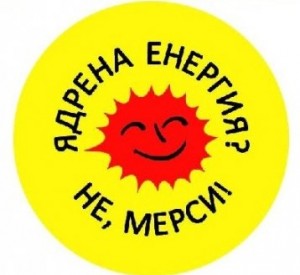
Bulgaria’s former Energy Minister suggested that there were several ways to interpret the results of the referendum.
“Of those who voted “no”, some voted against the Belene NPP, others against nuclear energy in general, still others against Belene NPP but for a seventh unit at the Kozloduy NPP, others against Belene NPP and against 7th unit, but for an extension of the lives of units 5 and 6, so there is a huge risk that you voted for one thing, while your answer is interpreted another way,” he explained.
He claimed that the referendum would still have resulted in nothing even if the question had been stated clearly.
“People told politicians that they are mature enough to understand when they are being sold a fake item,” Traykov pointed out.
Bulgaria’s former Energy Minister said that he had abstained from voting at the referendum.
According to preliminary results of the January 27 referendum on the development of nuclear energy in Bulgaria, a total of 60.55% voted in favor of the construction of a new nuclear power plant in the country.
With 97.14% of the votes counted, it emerged that a total of 832 742 people had backed the potential construction of a new nuclear power plant, while 522 927 had voted against.
The referendum was invalidated by low turnout, as merely 21% of the eligible voters cast ballots.
As the turnout is over 20%, and more than half of the votes are positive, the question is to be returned to Parliament for further discussion.
The government says it supports the provision of nuclear power from an existing plant at Kozloduy, but that it does not have the 10bn euros (£6.3bn; $13.4bn) it says would be needed to build a new plant.
Bulgaria had to close four of its old reactors at Kozloduy as a precondition for its 2007 EU membership.
The government froze plans to finish the plant at Belene last year, when work at the site on the southern bank of the River Danube was already well under way.
The Socialists are seen as closely linked to the Belene project, having granted a construction contract for the plant to Russian state company Atomstroyexport in 2008. They say Belene would now cost 4-6bn euros to complete, and would lower electricity costs for consumers.
Source: Sofia News Agency, BBC.
“Il suo nome è sinonimo di gesta gloriose”, titola “za Izobilie”, testata di Rossosch, dove il Corpo d’armata alpino aveva stabilito la sua sede. Alla presenza delle autorità locali e di molti giovani delle scuole è stato inaugurato il monumento al maresciallo delle truppe corazzate, Pavel Rybalko, due volte insignito del titolo onorifico di “eroe dell’Unione sovietica. 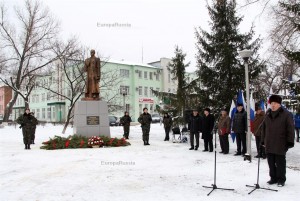
La Russia ricorda il 70esimo anniversario dell’operazione Ostrogov-Rossosch, che causò la ritirata dal fiume Don delle truppe dell’Asse durante la Seconda guerra mondiale. Tra qualche giorno, il 2 febbraio, sarà la volta della fine della battaglia di Stalingrado.
Cerimonie in occasione della “liberazione dal nazi-fascismo” si sono tenute un po’ ovunque in questo periodo nelle regioni di Rostov e di Voronezh. La maggiore in Italia è quella in calendario a Brescia.
“Abbiamo ricordato soprattutto le vittime di quelle terribili settimane – dice lo storico Alim Morozov, direttore del Museo del Medio Don, sito nell’asilo costruito dai volontari dell’Associazione nazionale alpini tra il 1992 ed il 1993 -. Oramai di veterani non ce ne sono quasi più”.
Un tempo in gennaio venivano in tanti dall’Italia per ripercorrere il triste cammino della ritirata. Chi a piedi, chi in autobus. “Quest’anno abbiamo visto soltanto un certo Alfredo della provincia di Brescia ed un piccolo gruppo portato da un’agenzia di turismo di Mosca”, racconta Morozov, che ha pubblicato recentemente due libri.
Il suo “Gli italiani a Rossosch 1942-43” è uscito in russo, ma la traduzione nella lingua di Dante verrà edita entro settembre 2013, quando oltre un migliaio di alpini con le loro famiglie sono attesi sul Medio Don per festeggiare insieme il ventesimo anniversario dell’edificazione dell’asilo.
РГГУ признан востребованным вузом.
27 Dec 2012Результаты рейтинга российских вузов, оглашенного в канун нового года Российским союзов ректоров (РСР), не подтверждают итогов мониторинга Минобрнауки. Так, признанный малоэффективным РГГУ вошел в топ-десятку, а бывший Ленпед — в топ-двадцатку самых востребованных университетов. 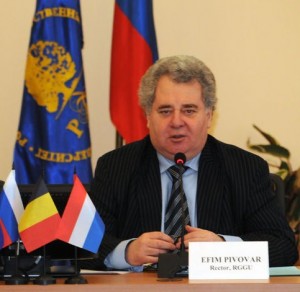
И еще об РГГУ. По словам ректорa НИУ ВШЭ Ярославa Кузьминова, «это — сильный вуз со своей школой. Наука там, может, и не очень сильна, но ее финансирование — задача государства. А она до сих пор не решена. Основная проблема РГГУ — 5,5 метров на одного студента. Но это — признак востребованности вуза, а также — сигнал учредителю (т.е. государству), что вузу нужно новое, дополнительное здание. Сам вуз сегодня себе его купить не может. Это — задача государства. А вуз лишь должен пересмотреть свою деятельность и перенацелить ее на традиционно сильные направления». Ректор НИУ ВШЭ также подчеркнул, что у его вуза «нет и не было намерения присоединять к себе РГГУ. И Минобрнауки об этом знает».
Статья – Марина Лемуткина – Московский Комсомолец № 26128 от 26 декабря 2012 г.
Today we held our 30th EU-Russia Summit. This is a real tribute to the important nature of our partnership. It demonstrates the priority which we attach to this strategic relationship. Russia and the EU have a lot to gain from cooperating.
Our economies are strongly linked:
45 % of Russia’s exports go to the EU, while 35 % of Russia’s imports come from the EU.
We are neighbours on our continent. More than 5 million Schengen visas were issued in 2011 in Russia. We may have different positions in some areas but we have more common interests. We must work together to guarantee security and stability on the European continent, to tackle global challenges and governance issues, and to promote economic growth. 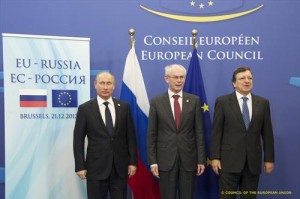
We have had a positive and constructive working summit. It provided us with an important occasion to take stock of main developments and to review progress and challenges across the wide range of EU-Russia relations. We also discussed how we can deepen our cooperation and implement already agreed commitments.
Our Partnership for Modernisation works. We have taken note of the latest Progress Report, and welcome the good results achieved in many areas. Further progress has to be made in the negotiations towards a New Agreement, which can put our future relations on a solid legal basis. The EU is very eager to progress faster in these negotiations.
We have discussed domestic economic developments in Russia and the EU. I explained the decisions of last week’s European Council regarding the strengthening of the EMU and the huge progress we made in stabilising the euro zone.
The EU is deeply convinced that we need to create space for civil society activities in order to achieve an effective modernisation of the economy and of the society.
We have noted the outcome of our latest Human Rights Consultations on 7 December which provided a useful occasion to discuss our concerns on the freedom for civil society activities and the exercise of fundamental rights in Russia. I mentioned also other concerns, including the case of Sergey Magnitsky.
As regards foreign policy, we have discussed ways to deepen our political cooperation at global level. We already work well together on issues like the Middle East Peace Process, Afghanistan or Iran. We have to continue our efforts to find a peaceful political solution on Syria in full support of Mr Brahimi’s efforts.
Russia and the EU work closely together in the Quartet, and we remain committed to a two-state solution to the Israeli-Palestinian conflict. In this respect I would like to highlight the joint statement by Foreign Minister Lavrov and High Representative Ashton today on the Middle East Peace Process.
As regards our Common Neighbourhood, I highlighted the need to achieve stability and security as well as democracy and a market-oriented economy. This is the aim of EU’s support within the Eastern Partnership Programme, especially as regards to Ukraine, Moldova and Georgia.
We welcome that the elections in Georgia open up new opportunities to improve bilateral relations and work towards stability in the Southern Caucasus, on the basis of the respect for territorial integrity.
It is particularly important to address the protracted conflicts. I also raised the importance of moving forward in the ‘5+2’ talks on the conflict in Transnistria and expressed concerns regarding developments in Nagorno-Karabakh.
By working together, the EU and Russia can make a decisive contribution to global governance and regional conflict resolution, to global economic governance in the G 8 and G 20, and to a broad range of international and regional issues. I would like to congratulate President Putin for taking over the presidency of G 20.
I am pleased that President Putin and the EU have discussed all these issues openly in a very constructive atmosphere. I want to thank the President of the Russian Federation for the constructive and productive exchange.
Press statement
by the President of the European Council
Herman Van Rompuy
following the 30th EU-Russia Summit.
Brussels, 21 December 2012
EUCO 243/12
PRESSE 557
PR PCE 206
«Первый. «Российские сироты, усыновлённые в Америку, лишаются Родины». Это лицемерие. У маленьких детей нет политического мышления. Они даже папа-мама ещё не говорят (а некоторые вообще не заговорят). У них нет абстрактного мышления. Нет понимания философских категорий (Родина, Добро, Зло)…
Второй аргумент. «Надо, чтобы нашим сиротам здесь было хорошо». Этот довод вы повторили на пресс-конференции и даже сослались на премьер-министра Медведева: мол, вы с ним это обсуждали. 
Спасибо большое. Мы полностью согласны: надо, чтобы здесь было хорошо. Ещё надо, чтобы здесь делали хорошие машины…
В Америке пытают — это третий расхожий аргумент.
Да, там пытают террористов, пойманных живьём, и тех, кого подозревают в терроризме. Что поделаешь, это война. Когда наши ловят террориста (или подозреваемого), то из него любым способом достают всю информацию. Это, увы, необходимость. Надо, чтобы пойманный как можно скорее сообщил пароли, явки, адреса — это поможет предотвратить теракт, спасти людей. И в Москве любым способом достают из пленника информацию, и в Чечне, и в Америке. Недавно показали человека, который, как утверждалось, планировал ваше убийство. Рожа этого парня была распухшая и вся вымазана зелёнкой — думаете, это ему прыщики прижигали? …
Каждый младенец, как только вылез на свет божий, — уже гражданин РФ. Ему повезло — его интересы защищает Конституция РФ. Там есть статья 27: «Каждый может свободно выезжать за пределы Российской Федерации».
Ну, и с какой стати эти депутаны, нарушая Конституцию, препятствуют гражданам РФ свободно выезжать отсюда куда угодно? …
Ещё один постоянный аргумент против усыновления в Америку: там погибло 19 детей из России. Да, из десятков тысяч усыновлённых там погибло 19. За эти же годы здесь, в России, погибли тысячи. На днях опубликован список — бесконечный мартиролог! — детей, которых родные матери, отцы, отчимы убили всего лишь за то, что они плакали, мешали. Детей выбрасывают из окна, душат, морят голодом до смерти, разбивают голову об угол; откройте в интернете — почитайте сами. »
Статья – Александр Минкин – Московский Комсомолец № 26124 от 21 декабря 2012 г. – Aleksandr Minkin.
Rapporti con gli Stati Uniti, crisi siriana, questioni interne. Vladimir Putin è stato incalzato da circa mille duecento giornalisti per quattro ore e mezza, molto più a lungo di quanto preventivato. Ad un certo punto è quasi sembrato che il capo del Cremlino non volesse più chiudere la mega-intervista per mostrare ai presenti di essere tornato in forma come ai bei tempi. I problemi di salute alla schiena di quest’autunno sono apparsi quindi superati. 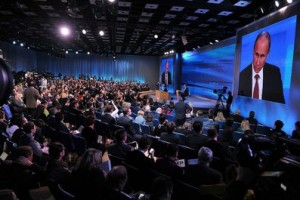
Il piglio del presidente russo nel rispondere alle domande, anche a quelle più scomode, è stato quello solito. Dopo aver sciorinato le cifre più che buone sullo stato dell’economia federale – Pil +3,7%, inflazione al 6,3%, tasso di disoccupazione al 5,4%, riserve valutarie pari a 527 miliardi di dollari – è iniziata l’interminabile maratona mediatica.
Vladimir Putin è d’accordo con l’iniziativa della Duma di bloccare le adozioni di bambini russi da parte di cittadini statunitensi. “Hanno cambiato – ha rimarcato il capo del Cremlino, andando all’attacco contro il Congresso Usa, – una legge anti-sovietica (ndr. la Jackson-Vinik del 1974) con una anti-russa”. Washington intende in quel modo colpire i corrotti e chi calpesta la democrazia in Russia. Una simile legge è già approdata anche all’Ue, a Strasburgo. Mosca ha subito reagito con una contro iniziativa legislativa anti-Usa. Non si è capito, però, perché siano state scelte le adozioni internazionali. Conclusione: a rimetterci saranno le migliaia di bambini abbandonati negli orfanatrofi russi.
I giornalisti presenti hanno fatto notare che le adozioni nazionali sono ben poca cosa rispetto all’enorme necessità di dare una casa alle centinaia di migliaia di sfortunati. Ma non c’è stato nulla da fare.
Parlando delle questioni aperte con la Casa bianca e sottolineando che i problemi sono sorti con la guerra in Iraq, Putin ha ricordato la spinosa questione dello Scudo anti-missilistico, che gli occidentali sono intenzionati a dislocare nel Vecchio Continente. “Che gli interessi russi vengano rispettati”, è stato il suo appello.
Mosca non è preoccupata per la sorte di Bashar al-Assad e capisce che “certamente servono cambiamenti in Siria. Quello che a noi interessa è cosa succederà dopo”. La vicenda libica ha insegnato che le soluzioni politiche vanno preferite a quelle militari, quando ci si trova di fronte al rischio della dissoluzione di uno Stato.
Putin ha negato che lo Stato da lui creato sia “autoritario”. Se fosse così l’attuale leader russo avrebbe fatto emandare nel 2008 la Costituzione, che vieta più di due mandati presidenziali. Così non è stato. “Abbiamo garantito la stabilità”, ha contro ribattuto Putin, secondo il quale “la democrazia non significa anarchia”. Per quanto riguarda l’ex oligarca Michail Khodorkovskij, ora in carcere, il capo del Cremlino ha messo in evidenza che il sistema giudiziario in Russia è indipendente da quello politico e lui non ha nulla a che vedere con quel caso. Anzi Putin si è augurato che una volta libero nel 2014 l’ex uomo più ricco del Paese goda di buona salute.
“Se Gerard ha bisogno di un permesso di soggiorno o di un passaporto russo – ha detto sorridendo Putin riferendosi all’attore francese Depardieu, che sta emigrando per evitare l’elevata imposta appena decisa da Parigi – il problema è risolto”.
Un primo colpevole siede in prigione da venerdì scorso. Dmitrij Pavljuchenkov è stato condannato ad 11 anni di colonia penale a regime duro. E’ stato provato che l’ex ufficiale di polizia ha pedinato per giorni la giornalista ed ha fornito al killer l’arma del delitto.
Pavljuchenkov non ha, però, fatto il nome dell’assassino né tanto meno quello dei mandanti. Ha raggiunto un accordo preventivo secondo il quale lui ammetteva quanto attribuitogli, evitando di testimoniare pubblicamente in aula. 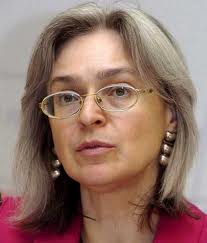
Questa scelta della Procura ha provocato polemiche a non finire, ma l’obiettivo di tale decisione è stato quello di arrivare ad una svolta per stabilire un primo punto fermo, dopo anni in cui gli inquirenti hanno letteralmente brancolato nel buio.
Pavljuchenkov si è fatto soltanto scappare di bocca che prima dell’omicidio non erano solo i “criminali” a seguire la scomoda giornalista, famosa per le sue inchieste sul malaffare e per le sue posizioni anti-Cremlino, ma anche vari “servizi”.
Da qui la conferma di quanto da sempre affermato dalla famiglia Politkovskaja, ossia che dietro all’uccisione della congiunta si celi un vero complotto. Come si ricorderà la reporter venne uccisa sul pianerotto dello stabile in cui aveva affittato nel centro di Mosca un appartamento il 7 ottobre 2006.
Nel 2009 sono stati processati tre fratelli ceceni, poi assolti per mancanza di prove. Secondo gli investigatori Rustam Makhmudov sarebbe stato il killer della giornalista, mentre gli altri due avrebbero avuto il compito di palo ed autista del commando.
Il terzetto, insieme al condannato Pavljuchenkov, sarebbe stato al soldo di un boss loro connazionale, tale Lomali Gaitukaiev, adesso in galera per altri reati. Un altro figurante in questa vicenda è un secondo poliziotto, che avrebbe fornito al gruppo di fuoco aiuto logistico.
In sintesi, se più o meno gli inquirenti sono riusciti a ricostruire la scena del delitto è invece buio fitto sui mandanti. In passato Dmitrij Muratov, il direttore della Novaja Gazeta, la testata per la quale lavorava la reporter uccisa, ha puntato il dito contro le autorità, sostenendo che esiste “un tabù politico” che blocca l’identificazione di chi ha materialmente pagato il commando.
Impossibile capire anche il movente dell’omicidio. La Politkovskaja aveva nemici ovunque, nella galassia della criminalità organizzata ed in quella dei servizi deviati, in Russia come in Cecenia.
The Ministry of Justice has received the independent report of the law firm Skadden, Arps, Slate, Meagher & Flom LLP, following its investigation of the Yulia Tymoshenko prosecution for exceeding her official powers at the conclusion of contracts between Russian Gazprom and Naftogaz Ukraine.
In accordance with the signed agreement, Skadden, Arps, Slate, Meagher & Flom LLP has delivered an independent report that clearly documents the events that were the subject of the trial and the trial itself. Through detailed analysis and a focus on the evidence, the report addresses critics, who have challenged the legal process and also the conviction, based on Yulia Tymoshenko’s claims that the prosecution was politically motivated and that her human rights have been abused. For this reason, the Ministry of Justice asked the leading international law firm to investigate the matter, taking into account all legal documents and opinions of all parties. 
This report, published today on the Ministry’s website without amendment, concludes as groundless Yulia Tymoshenko’s claims that her prosecution was politically motivated and states that she has provided no factual evidence that would be sufficient to overturn her conviction under European or American standards.
The report also points out that Yulia Tymoshenko’s conduct in court would have been unacceptable in other countries and would likely have resulted in a contempt of court finding.
The Skadden, Arps, Slate, Meagher & Flom LLP report shows how Yulia Tymoshenko overstepped her authority and committed this crime:|
1. by drafting Directives that set forth the terms that she and Prime-minister of Russian Federation had agreed to;
2. by ordering the head of NAK Naftogaz Ukraine to sign an agreement with Gazprom in the absence of approval from the Cabinet of Ministers;
3. by threatening to fire the head of NAK Naftogaz Ukraine if he did not sign the agreement;
4. and by deceiving the head of NAK Naftogaz Ukraine into believing that the Cabinet of Ministers had approved the agreement after producing an official looking document bearing her signature and the seal of Ukraine’s Cabinet of Ministers, despite the fact no such approval had been given for the document named “Directives”.
Even where the Skadden, Arps, Slate, Meagher & Flom LLP Report questions certain procedural decisions by the court, it concludes that these decisions were based on actions by Tymoshenko designed to disrupt the court’s work.
The court concluded that Yulia Tymoshenko’s actions caused grave damage to Ukraine, since citizens of Ukraine continue to pay the highest prices in Europe for their gas due to Tymoshenko’s deal with Russia. In this sense, every citizen of this country is a victim of this crime.
The Ministry of Justice is grateful to Skadden, Arps, Slate, Meagher & Flom LLP for this professional analysis that unconditionally lays out the facts of this matter.
Contact: Press Office – Ministry of Justice
Telephone: +38 044 271 17 33
Email: press@minjust.gov.ua
Welcome
We are a group of long experienced European journalists and intellectuals interested in international politics and culture. We would like to exchange our opinion on new Europe and Russia.
Categories
- Breaking News (11)
- CIS (129)
- Climate (2)
- Energy&Economy (115)
- EU Eastern Dimension (85)
- Euro 2012 – Sochi 2014 – World Cup 2018, Sport (43)
- Euro-Integration (135)
- History Culture (198)
- International Policy (261)
- Military (74)
- Interviews (18)
- Italy – Italia – Suisse (47)
- Odd Enough (10)
- Poland and Baltic States (126)
- Religion (31)
- Russia (421)
- Survey (4)
- Turning points (4)
- Ukraine (176)
- Российские страницы (113)
Archives
- November 2020
- October 2020
- September 2020
- August 2020
- July 2020
- May 2020
- April 2020
- March 2020
- January 2020
- December 2019
- November 2019
- October 2019
- September 2019
- August 2019
- July 2019
- June 2019
- May 2019
- April 2019
- March 2019
- February 2019
- December 2018
- November 2018
- October 2018
- September 2018
- August 2018
- July 2018
- June 2018
- May 2018
- April 2018
- March 2018
- February 2018
- January 2018
- December 2017
- November 2017
- October 2017
- September 2017
- August 2017
- July 2017
- May 2017
- March 2017
- January 2017
- December 2016
- November 2016
- October 2016
- September 2016
- July 2016
- June 2016
- May 2016
- April 2016
- February 2016
- January 2016
- November 2015
- October 2015
- September 2015
- June 2015
- April 2015
- March 2015
- February 2015
- January 2015
- December 2014
- November 2014
- October 2014
- September 2014
- August 2014
- July 2014
- June 2014
- May 2014
- April 2014
- March 2014
- February 2014
- January 2014
- December 2013
- November 2013
- October 2013
- September 2013
- August 2013
- July 2013
- June 2013
- May 2013
- April 2013
- March 2013
- February 2013
- January 2013
- December 2012
- November 2012
- October 2012
- September 2012
- August 2012
- July 2012
- June 2012
- May 2012
- April 2012
- March 2012
- February 2012
- January 2012
- December 2011
- November 2011
- October 2011
- September 2011
- August 2011
- July 2011
- June 2011
- May 2011
- April 2011
- March 2011
- February 2011
- January 2011
- December 2010
- November 2010
- October 2010
- September 2010
- August 2010
- July 2010
- June 2010
- May 2010
- April 2010
- March 2010
- February 2010
- January 2010
- December 2009
- November 2009
- October 2009
- September 2009
- August 2009
Our books




